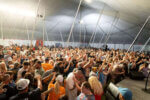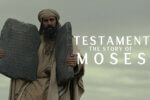But Christians are being warned not to limit their concerns to only gay marriage and abortion
Moral values topped the list of reasons voters re-elected President Bush Nov. 2, presenting what one Christian leader called an unprecedented evangelism opportunity.
“I think it’s obvious that the church has not created a wave, we’ve struck a nerve,” said Rod Parsley, pastor of World Harvest Church in Ohio and founder of the Center for Moral Clarity. “We’ve tapped into the views of the majority of Americans. The left has done just that, they’ve left, and they no longer represent mainstream America. That gives us a tremendous evangelistic opportunity.”
Parsley traveled across his state before the election, urging Christians to vote and to support righteousness. He said many of those who cited values as their primary concern on Election Day were not all committed Christians. “Americans realize our basic common values … were under attack,” he said.
Many Christian leaders celebrated Bush’s win, crediting prayer with the decisive swing to the right. Bush gained 62 percent of the Christian vote, according to a poll by the Barna Research Group, which attributed Bush’s win to strong turnout by born-again voters. With the House, Senate and White House under Republican control, many believe an amendment banning gay marriage has a stronger chance at passage.
“The move to amend the U.S. Constitution to preserve traditional marriage will move full steam ahead,” said Mathew Staver, president of Liberty Counsel, which champions religious liberty, pro-life and traditional family issues. “Although the battle for the U.S. Supreme Court is not over … this election sets the future course.”
Gay marriage may have been the issue that gained Bush more support among Hispanic and African American voters, analysts say. Bush won 11 percent of the black vote, a 2 percent increase over 2000, and 44 percent of the Latino vote, a 9 percent increase over 2000, according to exit polls reported by CNN.
Before the election, the Joint Center for Political and Economic Studies, a think tank that specializes in African American issues, predicted that Bush might double his percentage of the black vote, from 9 percent to 18 percent. That didn’t happen, but the group’s president and senior analyst, David Bositis, said Bush got more of Ohio’s black Christian vote than he did in 2000.
Had those votes gone to Sen. John Kerry, he said, it would have been possible for the Democratic nominee to win the state that ultimately decided the election. “Given negative black attitudes on the war and the economy and negative views on Bush, I really wasn’t expecting that kind of movement,” Bositis said, noting that Bush gained 16 percent of the black vote in Ohio, up from 9 percent in 2000.
Similarly, pre-election polls showed that Latino voters were strongly opposed to gay marriage, though a majority was still likely to vote for Kerry. A poll by the Tomás Rivera Policy Institute (TRPI) of the University of Southern California, which studies Latino voting patterns, found that although more than 70 percent of Latino voters said religion was very important to them, many opposed the war and preferred Kerry’s policies on education and the economy. TRPI president Harry Pachon said many elected officials were blindsided by the role moral values played in the election.
“We hear that in New Mexico, evangelicals were instrumental in mobilizing Latino voters,” Pachon said. “Twenty percent of Latinos are … evangelical or Pentecostal. If you had a significant number of them mobilized to vote for Bush, that may explain [the increase in support over 2000].”
In 11 states, voters approved constitutional amendments limiting marriage to one man and one woman, most by wide margins. In an article by PlanetOut Network, gay activists called Bush’s win “a really tough defeat.”
But Matt Coles of the American Civil Liberties Union’s Lesbian and Gay Rights Project told the publication that his group is vigorously pursuing gay rights-related lawsuits in several states, including California, New York, Washington, New Jersey and Florida.
Meanwhile, the National Association of Evangelicals is promoting an agenda of its own, which Richard Cizik, the group’s vice president for governmental affairs, said includes broadening the definition of moral values to include an array of issues from human rights to the environment.
“[Moral values] should impact everything from tax cuts to social security,” Cizik said, adding that evangelicals must not be seen as a single-issue special-interest group.
“The challenge is to appreciate that here in Washington, D.C., [values] is not merely about legislation,” Cizik said. “It’s about broad-based ethical renewal. By focusing on ethics, we immediately signal that changes must be directed toward institutions other than government, such as Hollywood.”
But there is one government institution that many conservative voters kept in clear view on Election Day: the Supreme Court. Bush is expected to choose as many as four new justices during his second term, which some observers say will significantly affect abortion.
“Many of the religious liberty cases we deal with are decided on a 5-4 basis,” said Jay Sekulow, chief counsel for the American Center for Law and Justice. “With news of [Chief Justice William Rehnquist’s] medical condition, it now appears that the issue of the Court will be front and center for the nation over the next several weeks and months.”
Still, it is well known that not all socially conservative Christians supported Bush, and talk of Justice Clarence Thomas’ replacing Rehnquist if he retires doesn’t sit well among many African American voters–Christian and non.
“We need to have a family meeting with Clarence Thomas because his stance on civil rights is illogical and insensitive,” said Bishop Harry R. Jackson Jr., a Washington, D.C., pastor and leader of the High Impact African-American Church Coalition. “The truth is, we haven’t made things right yet.”
Though he is a registered Democrat, Jackson announced his support for Bush in October and predicted that black Christians would decide the election. He believes that happened in Ohio. Considering the race riots that have plagued Cincinnati in recent years, Jackson said, “for that many black Christians to vote that overwhelmingly for Bush … that is nothing short of miraculous.”
His coalition is planning summits nationwide to mobilize black Christians to support a federal amendment limiting marriage to one man and one woman. But he said the group also will promote “justice” issues, such as reducing poverty among African Americans, reforming the education and prison systems, helping minorities gain better health-care access and ending the Sudan conflict.
“We’ve had Watergate and all these other gates; I think now we have a Justicegate,” Jackson said. “It’s unconscionable that Americans would vote out of fear about marriage but would not vote out of responsibility for justice. That’s a matter of maturity and having a biblical worldview as Christians.”
Adrienne S. Gaines






Leave a Comment
You must be logged in to post a comment.